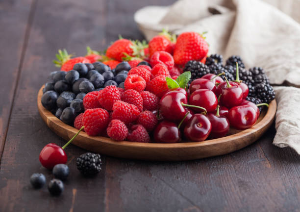Protein is an essential nutrient for our bodies, playing various critical roles such as muscle formation, immune system enhancement, and hormone production. While protein is commonly consumed through foods like meat, eggs, and tofu, there are also fruits with surprisingly high protein content. These fruits not only taste great but also offer significant health benefits, making them a valuable addition to your diet for a well-rounded intake of various nutrients. Here, we introduce fruits with high protein content.

Guava: The King of Protein Among Tropical Fruits
Guava is a tropical fruit rich in vitamin C and fiber, boasting 4.21g of protein per cup, the highest among all fruits. Additionally, guava provides 376mg of vitamin C, exceeding 400% of the daily recommended intake. With its sweet and tangy flavor, guava is perfect for salads, smoothies, or as a snack.
The high vitamin C content in guava strengthens the immune system, promotes skin health, and helps eliminate harmful oxygen in the body through its antioxidant properties. Furthermore, its rich fiber content aids digestive health by promoting the growth of beneficial gut bacteria and strengthening the gut barrier.
Avocado: A Harmony of Healthy Fats and Protein
Avocado is well-known for its rich content of healthy fats and protein. One 201g avocado contains 4.01g of protein, along with significant amounts of fiber, vitamin E, vitamin C, magnesium, and folate. Avocado pairs well with salads, soups, grain dishes, and makes an excellent snack on its own.
The healthy fats in avocado support heart health, while vitamin E promotes skin and hair health. Additionally, vitamin C and magnesium boost the immune system, and folate is crucial for cell division and DNA synthesis. Hence, avocado is a fruit that provides not only protein but also a variety of nutrients, making it an essential part of any diet.
Blackberries: Small Fruits with Big Nutrition
Blackberries have higher protein content compared to other berries and are rich in antioxidants. One cup of fresh blackberries provides 2g of protein and contains fiber, vitamin C, vitamin K, and manganese. Blackberries are easy to eat, making them suitable for breakfast or as a snack.
The high fiber content in blackberries significantly contributes to digestive health. Fiber promotes the growth of beneficial gut bacteria, strengthens the gut barrier, and aids in regular and comfortable bowel movements. Additionally, vitamin C and antioxidants enhance the immune system and help protect cells from damage.
Cherries: A Sweet Choice for Heart Health
Cherries are beneficial for reducing high blood pressure and cholesterol levels, as well as improving blood sugar control. One cup of sweet cherries contains 1.63g of protein and is rich in vitamin C, potassium, and antioxidants like anthocyanins. Cherries can be eaten fresh or used in various dishes such as desserts, salads, and smoothies.
Anthocyanins in cherries are powerful antioxidants that reduce inflammation and promote heart health. Vitamin C boosts the immune system, and potassium is vital for blood pressure regulation. Therefore, cherries are beneficial for preventing heart disease and maintaining overall health.
Kiwi: A Reliable Friend for Immune and Digestive Health
Kiwi is a fruit rich in vitamin C and protein, significantly aiding in boosting the immune system. One cup of kiwi provides 2g of protein and contains various vitamins and minerals like folate, vitamin C, E, and K. Kiwi can be eaten fresh or added to salads, yogurt, and smoothies.
The high vitamin C content in kiwi effectively strengthens the immune system, while vitamin E promotes skin health through its antioxidant action. Additionally, kiwi's rich fiber content aids digestion and helps prevent constipation. Kiwi is particularly effective in softening stool and supporting regular bowel movements.
Pomegranates: A Treasure Trove of Protein and Antioxidants
Pomegranates provide 2.9g of protein per cup, making them surprisingly high in protein. They are also rich in fiber, playing a crucial role in digestive and heart health. Furthermore, pomegranates contain antioxidants and anti-inflammatory compounds like anthocyanins and organic acids. Pomegranates can be eaten fresh or consumed as juice.
Studies have shown that pomegranates help improve cognitive function, reduce risk factors for heart disease, and support post-exercise recovery. The antioxidants in pomegranates are particularly effective in reducing inflammation and protecting cells from damage.
The Importance of Protein Intake through Fruits
Protein is an essential nutrient that performs various functions in our bodies. Besides traditional protein sources like meat and tofu, consuming protein through fruits is highly beneficial. Fruits are convenient to eat in their natural and fresh state and provide additional vitamins and minerals, enhancing overall health.
Protein intake through fruits is especially important for vegetarians and vegans. For those who do not consume meat or animal products, fruits can be an excellent source of protein. Additionally, fruits are generally low in calories and high in fiber, aiding in weight management.
Conclusion: Take Care of Your Health with a Variety of Fruits
Fruits are excellent foods that provide both taste and nutrition. Fruits with high protein content, in particular, greatly aid in muscle formation, immune system enhancement, and digestive health. Include a variety of fruits like guava, avocado, blackberries, cherries, kiwi, and pomegranates in your diet to maintain a healthy lifestyle. Fruits are easy to eat and versatile in various dishes, making meal preparation more enjoyable. Start your healthy protein intake through fruits today.



